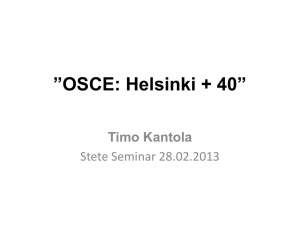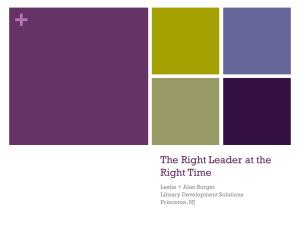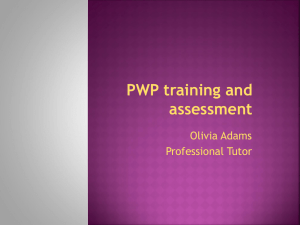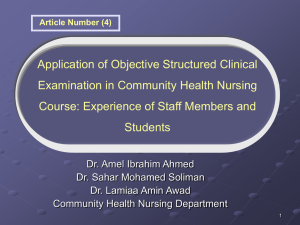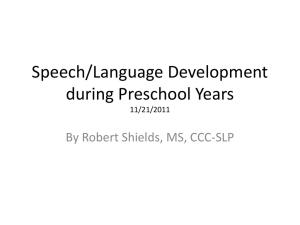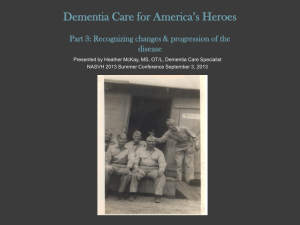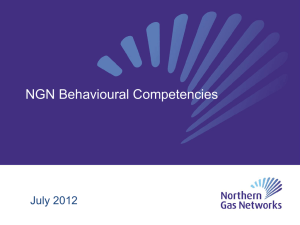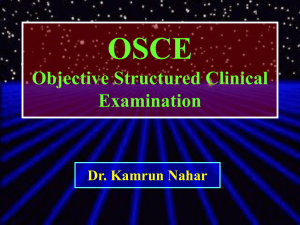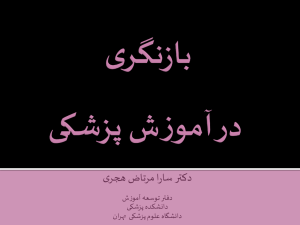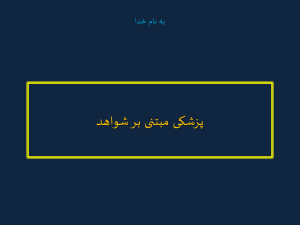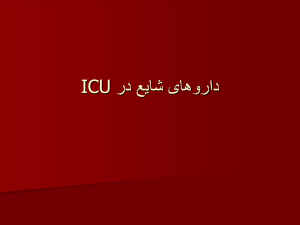ارزشيابي صلاحيت باليني بوسيله OSCE
advertisement
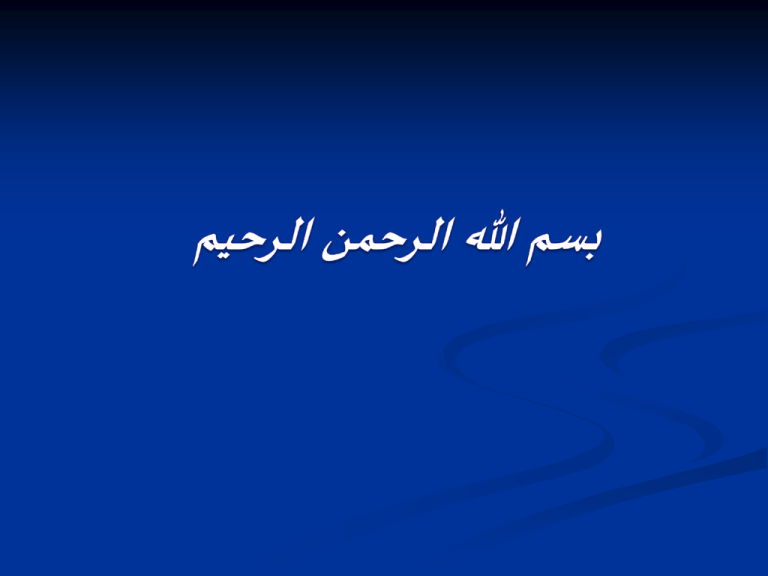
ارزشیابی صالحیت بالینی به وسیله آزمون بالینی ساختارمند عینی)(OSCE زهرا موفقی صالحیت بالینی چیست؟ تلفیق دانش ،مهارت عملی و نگرش های حرفه ای در ضمن انجام یک وظیفه بالینی پیچیده نگرش دانش مهارت عملی Rice et al., Competency-based objectives for clinical training. Can. J. Med. Technol. 57:136, 1995 صالحیت بالینی “به کارگیری عادتگونه و مدبرانهي دانش ،مهارتهای ارتباطاتی ،مهارتهاي عملي ،استدالل باليني ،عواطف ،ارزشها و بازانديش ي در فعاليت حرفهاي روزمره، در جهت خدمت به فرد و جامعه" Epstein and Hundert, Designing and assessing professional competence. JAMA 287:226, 2002 What is the best way to evaluate Clinical Competency? Behavior Skills & attitudes Performance assessment: Masked SP Competency assessment: OSCE Clinical based tests: MCQ Knowledge Knowledge tests: MCQs Miller’s Pyramid of Competency Miller GE. The assessment of clinical skills, competence, performance Acad Med, 1990; 65(Suppl.):S63-S67. Objective Structured Clinical Examination Station OSCEs - Objective همه دانشجویان با یک معیار ارزشیابی می شوند OSCEs - Structured ابزار اندازه گیری در هر ایستگاه ،ویژه همان ایستگاه تنظیم شده است در هر ایستگاه یک مهارت بالینی ویژه مورد ارزشیابی قرار می گیرد OSCE – Clinical Examination آزمون توانایی انجام مهارتهای بالینی استOSCE Students have to demonstrate their skills, not just describe the theory Clinical Examination ارزشیابی رفتار حرفه ای و مهارتهای ارتباطی ایستگاه هایی با حضور بیمارنما فرایند را ارزشیابی کنید ،نه محتوا را مثال دانشجو چگونه صحبت کرد نه اینکه چه گفت ارزشیابی مهارتهای بالینی توانمندی دانشجو و فرایند انجام مهارت را ارزیابی کنید، نه نتیجه کار را Competencies: Six and Improvement: The Responds HOW YOUThe GET BETTER Competencies: Six Domain Sample Behaviors Within Each Domain Educational Outcomes Service Group Educational Outcomes Service Group Sample Behaviors Within Each Domain Writes legi Interpersonal and Sample Behaviors Within Each Domain Considers Communication Skills: patients Gathers essential and accurate information about Documents Gathers essential and accurate information about pa Prioritizes the purpose(s) ofHOW the visit YOU INTERACT Prioritizes the purpose(s) of the visit Uses effec Interpersonal and OTHERS Makes accurate diagnoses WITH Gathers essential and accuratediagnoses information about patients Makes accurate Possesses Prescribesthe appropriate therapeutic interventions Communication Skills: Prioritizes purpose(s) of the visit Patient Care: appropriate therapeutic interventions Creates an Counsels andPrescribes educates patient and families Patient Care: HOW YOU INTERACT Makes accurate diagnoses Interpersonal and Counsels and educates patient and families WHAT YOU DO and colleag Incorporates prevention into care plan WHAT YOU DO Prescribes appropriate therapeutic interventions WITH OTHERS Incorporates prevention into care plan Creates an Patient Care: Communication Skills: Conductsand an appropriate history and physical exam Counsels educates patient and families Conducts an appropriate history and physical examan families, WHAT YOU DO HOW YOU INTERACT Performs procedures well Incorporates prevention into care plan Performs procedures well Works effe Orders appropriate diagnostic tests WITH OTHERS Conducts an appropriate history and physical exam Orders appropriate diagnostic tests Presents a Performs procedures well Orders appropriate diagnostic tests Applies knowledge to patient care Professionalism: knowledge to patient care Responds DemonstratesApplies investigatory and analytic thinking HOW YOU ACT Demonstrates investigatory and analytic thinking Reliably co Knows knowledge and appliestobasic sciences Applies patient care basic sciences Medical Knowledge: Knows and applies Sees patie Medical Knowledge: Demonstrates Understands a) anatomy b)a) physiology c) biochemistry investigatory and analyticb) thinking Professionalism: Understands anatomy physiology c) Demonstra biochemis WHAT YOU KNOW d) microbiology e) pathology f) pharmacology g) neuroscience WHAT YOU KNOW Knows and applies basic sciences d) microbiology pathology f) pharmacology g) n HOW YOU e) ACT Medical Knowledge: Demonstra Understandsa)psychology/behavioral medicine Understands anatomy b) psychology/behavioral physiology c) biochemistry Understands medicine gender, dis WHAT YOU KNOW Professionalism: Understands function of surgical instruments d) microbiology e) pathology f) pharmacology g) neuroscience Understands function of surgical instruments Serves effe HOWmedicine YOU ACT Understands psychology/behavioral Understands function of surgical instruments Reads Reads Uses information totechnology support own Knows how Usestechnology information to education support own educatio Practice Based Learning Locates, evaluates andevaluates utilizes evidence-based resources Systems-Based Practice: Practice Based Learning Reads Knowsreso how Locates, and utilizes evidence-based Teaches students and other health care professionals (facilitates and Improvement: Uses information technology to support own education HOW Understand Teaches students andYOU otherWORK health care professiona and Improvement: Practice Based Learning learning)evaluates Locates, and utilizes evidence-based resources HOW YOU GET BETTER Bills appro learning) WITHIN THE SYSTEM HOW YOU GET BETTER Engages in continuing medical education Teaches students and other health care professionals (facilitates and Improvement: Systems-Based Practice: Engages in continuing medical education Understand Responds to feedback learning) Responds feedback HOW YOU GET BETTER Able to use HOW to YOU WORK Engages in continuing medical education Understand WITHIN THE SYSTEM Practice: Systems-Based Responds to feedback Practices c HOWby YOU WORK Handout prepared Ensures ac Writes legiblyWrites Lynne legibly Tomasa, PhD WITHIN THE SYSTEM Effectively Considers literacy level520-626-7823 of others A more extens Considers literacy level of others Competencies: The SIX Domains ،ABMS وACGME بر اساس دستور العمل مشترک :بهترین روش برای ارزشیابی مهارتهای زیر می باشدOSCE Interviewing Counsel & educate pt’s. & families physical exam Medical procedures Preventive health services Creating therapeutic relationship with patients Listening skills Respectful, altruistic Sensitive to cultural, age, gender, disability issues OSCE : blueprint History Interpersonal Physical Procedure communication Exam CVS RS GIS Repro NS MS Chest pain Disch drugs Cardiac BP Haemoptysis Smoking Resp Peak flow Abdo pain Gastroscopy Abdo PR Generic Pre-op assess Amenorrhoea Abnormal smear Cx smear Headache Eyes Backache Hip Consent for post mortem Ophthalmosc IV canulation Blood trans
